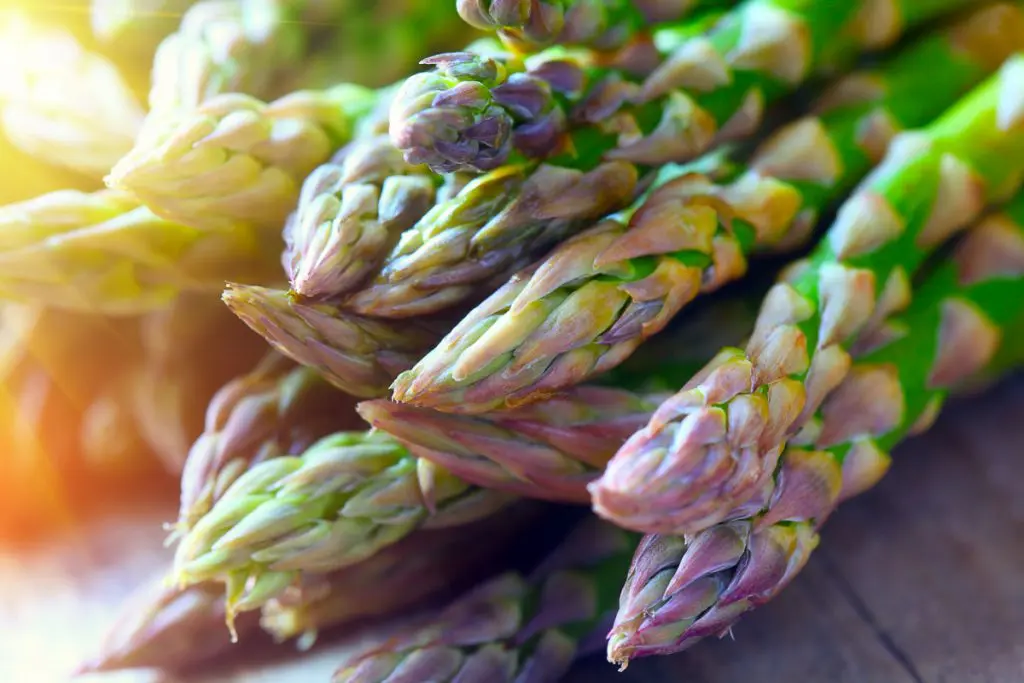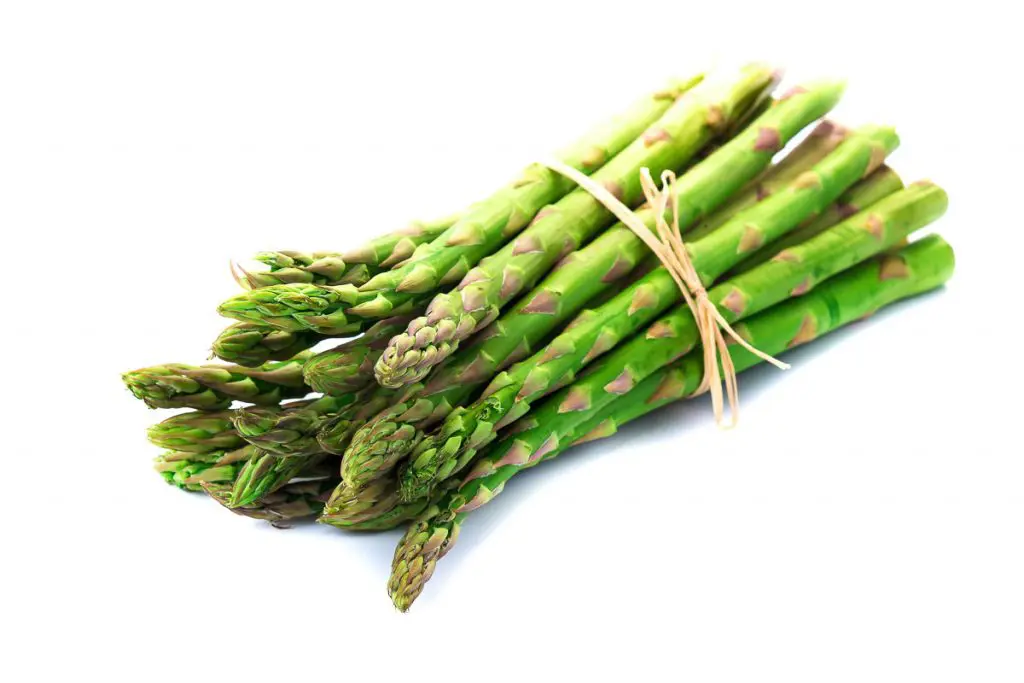Can Dogs Eat Asparagus? The Surprising Truth Revealed:
Is Asparagus Good for Dogs?
As a dog owner, you're likely constantly wondering if certain “people foods” like asparagus are suitable foods for your furry friend. The good news is that asparagus is not toxic for dogs, and they can safely eat it when properly offered the veggie. However, there are some precautions you should take before offering this vegetable to your pet.
It's essential to remember wild asparagus berries or flowers can be toxic for dogs, so make sure to keep your pup away from them at all times. Taking extra precautions, If you grow asparagus in your garden, you may want to put up a fence to prevent your dog from accessing the plants.

Can Dogs Eat Raw Asparagus?
I get asked if raw asparagus is a good option for your dog quite often when talking to pet owners about feeding their fur babies asparagus.
Although dogs can eat raw asparagus, it is not the best choice due to the vegetable's tough texture. Chewing and digesting uncooked asparagus can be challenging for your dog. It can also pose a choking hazard or cause an intestinal blockage.
When ingesting raw asparagus, your dog might experience vomiting, gas, diarrhea, or digestive system blockages.
To safely offer asparagus to your pet, you should trim the tough ends off the stalks and cook them until soft or at least al dente. This will make it easier for your dog to chew and digest the vegetable, reducing the risk of choking and other digestive issues.
Keep in mind that cooked asparagus can still cause side effects, such as upset stomach, gas, or even vomiting and diarrhea in some cases. So, it is crucial to monitor your dog's reaction when introducing asparagus into their diet, especially in those first 24 hours after ingestion of the new food.
Health Benefits of Asparagus for Dogs
Vitamins and Minerals
Asparagus is a nutrient-rich veggie that provides various vitamins and minerals beneficial to your dog's overall health. It's an excellent source of vitamins A, C, E, and K, which are essential for maintaining your dog's immune system, vision, and overall well-being.
Asparagus also contains essential minerals like potassium, calcium, and iron that contribute to strong bones and proper muscle function for your pup.
Antioxidants
As a natural source of antioxidants, asparagus can help protect your dog's cells from damage caused by free radicals. The abundance of antioxidants in asparagus, such as vitamin C and vitamin E, can improve your dog's immune system and overall health.
Including asparagus in your dog's diet may contribute to a reduction in inflammation, help maintain overall wellness, and potentially stave off certain cancers and illnesses.
Digestive Health
Asparagus is high in fiber, specifically, it contains both soluble and insoluble fibers. Soluble fiber helps regulate your dog's blood sugar levels and absorbs excess moisture, while insoluble fiber adds bulk to the stool, promoting regular bowel movements.
Including asparagus in your dog's diet can help support a healthy digestive system and potentially prevent constipation. However, please remember that it's very important to cook the asparagus before feeding it to your dog, as raw asparagus can be challenging to digest, possibly leading to upset stomach, gas, or diarrhea.

Asparagus Preparation and Serving
In this section, we will dive into the different ways to prepare and serve asparagus for your dog, focusing on raw and cooked asparagus, as well as portion size guidelines. Let's dive in!
Raw Asparagus
Although not recommended, dogs can eat raw asparagus. It's essential to note that raw asparagus may be difficult for them to chew and digest.
Instead of serving raw asparagus, you might want to consider choosing a softer vegetable. If you do decide to serve raw asparagus, make sure to cut it into small, bite-size pieces to make it easier for your dog to chew and minimize the risk of choking.
Cooked Asparagus
Cooking asparagus can make it a more suitable option for your dog. You can boil the asparagus before serving it to your pet, making it much easier to chew and digest.
Please make sure that you do not add any cooking fats or oils while preparing the cooked asparagus, as well as adding no seasonings of any kind. Cooking asparagus with fats or seasonings can cause gastric upset that you do not want your pup to endure.
Follow these steps in preparing cooked asparagus for your dog:
- Wash and trim the asparagus stalks.
- Place the asparagus in a pot of boiling water until tender, typically 4-5 minutes.
- Let the cooked asparagus cool before chopping the asparagus into bite-sized pieces.
- Serve a small amount to your dog.
Portion Size and Guidelines
When giving asparagus or any other food item to your dog, it is essential to follow the 10% rule. This means that treats, including vegetables like asparagus, should make up no more than 10% of your dog's daily diet.
To ensure that you are providing a proper portion size, you may want to consult your veterinarian before making any dietary changes.
Additionally, it's crucial to monitor your dog for any signs of digestive discomfort or allergic reactions after serving them asparagus, especially in the first 24 hours.
Overall, asparagus can be a healthy treat for your dog when prepared and served correctly. By following the guidelines mentioned above, you can safely include this nutritious vegetable in your dog's diet.

Potential Risks and Side Effects
Choking Hazard
As a dog owner, it's important to be aware of the potential choking hazards related to feeding your dog asparagus. Raw asparagus, with its hard and tough texture, can be difficult for dogs to chew and digest, which might lead to choking or intestinal blockages. To minimize these risks, you should only give your dog cooked asparagus, and make sure that the cooked asparagus is thoroughly chopped into small, manageable pieces.
Upset Stomach
Although asparagus itself is not toxic to dogs, its consumption may result in some side effects, such as vomiting, gas, and diarrhea, particularly when consumed in large quantities.
Introduce asparagus into your dog's diet slowly and gradually, and always monitor your pet for any sign of digestive discomfort. If your dog experiences any adverse reactions, discontinue the use of asparagus and consult your veterinarian.
Asparagus Fern
While the asparagus stalks are not toxic to dogs, the same cannot be said for their ferns. The asparagus fern is a part of the plant that grows alongside the edible stalks and can be toxic to dogs when ingested.
If your dog happens to consume the asparagus fern, it may experience any of the following symptoms: vomiting, diarrhea, and/or severe abdominal pain. To ensure your dog's safety, always remove the asparagus fern before giving it to your pet.
Alternative Vegetables for Dogs
When considering feeding asparagus to your dog, you might also want to explore other vegetables that can provide your pup with vitamins and nutrients. Some alternative options are green beans, sweet potatoes, and zucchini.
Green beans are a popular choice, as they are a low-calorie and nutritious snack for your dog. They are packed with vitamins C and K, as well as a good source of fiber. You can serve these either raw, steamed, or boiled but avoid adding any salt or seasoning. To make it easier for your dog to chew, chop the green beans into smaller pieces.
Sweet potatoes are another dog-friendly option. They contain high amounts of fiber and are rich in vitamins A, C, and B6. It's crucial to cook the sweet potato before serving it to your dog. Baking or boiling are two suitable methods, but don't add any oils/fats, sweeteners, or spices. After cooking, let the sweet potato cool to room temperature and cut it into manageable pieces for your fur baby.
Last but not least, zucchini is a healthy alternative to chew sticks, being low in calories and high in fiber. It also contains an array of vitamins and minerals that support bone, kidney, and heart health. Like green beans, you can serve zucchini raw, steamed, or boiled, cutting it into smaller pieces for your doggo.
Summary:
To wrap this question up in a pretty little bow, yes you can include asparagus in your dog's diet, but make sure it is cooked and not wild asparagus berries or flowers.
While your dog may be able to consume asparagus safely, there are alternative vegetables, such as green beans, sweet potatoes, and zucchini, that can offer them nutritional benefits as well.
Always observe your pet's reaction when offering new foods, and remember to always consult your veterinarian before introducing any new foods to your dog's diet.
![[Vet Explains Pets]](https://vetexplainspets.com/wp-content/uploads/2024/09/cropped-vetlogo-199x66.png)
